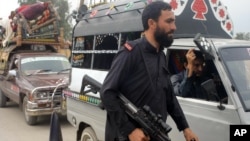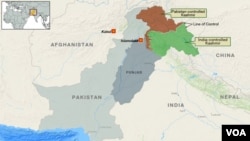Authorities in Pakistan have made fresh arrests as part of their crackdown on Islamic State loyalists to prevent the Middle Eastern terror group from establishing a foothold in the country.
The arrests came as a top Pakistani leader dismissed U.S. President Barack Obama’s assertions in his annual State of the Union address this week that Pakistan will be among the countries where instability will continue for decades in the wake of the threat from IS and al-Qaida.
Pakistani media reports said Friday that counterterrorism forces have rounded up 60 suspected IS supporters from different cities of the northwestern Khyber Pkhtunkhwa province as well as adjoining tribal areas bordering Afghanistan.
Information gleaned from IS supporters detained in recent weeks from parts of the country’s most populous province, Punjab, had reportedly led Pakistani authorities to make the fresh arrests.
Without giving any other details, a senior provincial security official, on condition of anonymity, confirmed to VOA the arrests of “a few people who were in possession of IS literature.”
The Pakistan government has vowed not to allow IS to establish a foothold in the country and cites raids against suspected cells of the group as a practical demonstration of its resolve.
“We have taken decisive action against terrorism,” Sartaj Aziz, Pakistani advisor to the prime minister on foreign policy, told reporters in Islamabad Friday.
Diminished threat
When asked whether he agreed with President Obama’s concerns about future instability in Pakistan, Aziz characterized them as mere predictions, and insisted that unlike the rest of the world, terrorism in his country is going down because of a focused national policy against the threat.
“These are obviously (Obama's) apprehensions and we have to prove through our both action as well policies that his prediction will not come out true as far as Pakistan (is concerned),” Aziz asserted.
The advisor noted that instability in Afghanistan remains a source of worry for Pakistan but it is working with the neighboring country to help it become more stable.
IS, which controls large territories in Iraq and Syria, has found some bases particularly in eastern Afghan areas on the Pakistani border.
The Middle Eastern terrorist group identifies Afghanistan, Pakistan and parts of Iran as its “Khorsan province.” Early last year it appointed a Pakistani militant leader, Hafiz Saeed Khan, as its emir (chief) for the region who is believed to be based on the Afghan side of the long porous border.
Khorasan classification
In Washington, the U.S. government announced Thursday that Islamic State - Khorasan is now formally listed as a foreign terrorist organization. It said Islamic State's regional operatives are primarily former members of the Afghan Taliban and the Tehrik-e-Taliban group waging a bloody insurgency against the state of Pakistan.
Islamic State - Khorasan, which is about one-year-old, said its first major attack in Afghanistan, on Wednesday, targeted Pakistan’s consulate in Jalalabad, the capital of the eastern Afghan border province of Nangarhar.
The assault left seven Afghan security personnel dead and caused injuries to at least ten people, including a Pakistani staff member at the diplomatic facility, according to officials.
Meanwhile, authorities in the Afghan province said it is unclear whether a U.S. drone strike Thursday killed Khan, along with 11 other militants in Achin district, which is believed to be and IS stronghold in Afghanistan.
“U.S. confirmed a strike in Achin District, Nangarhar province January 14 against a threat to the force. At this time we cannot confirm the claim that Hafiz Saeed (Khan) was involved in this strike, “ the U.S. military said in a brief statement sent to VOA.









